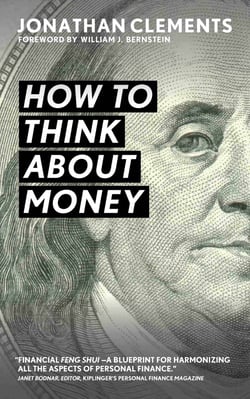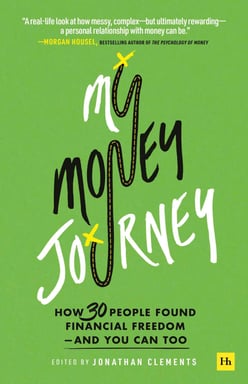
In a Nutshell: As a columnist for The Wall Street Journal for nearly 20 years, Jonathan Clements wrote about the junction between money and happiness, and how financial behavior differs among individuals. On the website HumbleDollar, Clements continues his exploration into the complexities of wealth building, retirement planning, and financial strategies. Clements and dozens of regular contributors counterpose arguments that range from the most arcane details of money management to the broadest views of what it’s all supposed to mean. Millions of readers come away with a better sense of their financial planning values and motivations.
HumbleDollar is a website for financial planners with other interests too. Editor Jonathan Clements, a personal finance columnist at The Wall Street Journal for almost 20 years, and dozens of contributing writers take deep dives into money, investing, and retirement — maintaining an eye on the everyday-life practicalities and variabilities of the topics they write about.
That puts finance into proper perspective, HumbleDollar argues. Controlling the controllables and making rational decisions never negates human individuality.
Clements is also the author of numerous personal finance books, including “How to Think About Money,” and is the editor of “My Money Journey,” a collection of inspiring financial life stories published in April 2023.

Clements became known as an advocate of index funds during his almost 20 years at WSJ, arguing that passive investment management and staying the course were less worrisome and more predictive than active strategies.
That meshed with his message to keep investing in a healthy perspective as part of a balanced life, financial and otherwise. At WSJ, he also wrote about the psychology of financial planning and the connections between money and happiness.
HumbleDollar continues that perspective online. Although a few of the site’s roughly 50 regular contributors are financial advisors, many have a layperson’s interest in finance. They come to the HumbleDollar eager to share their views and debate the issues with an engaged readership.
Clements said there’s almost nothing humans do that doesn’t have a financial angle, and personal stories provide the most vivid way to relate to someone else’s experience.
“We talk about personal finance, but we tend to emphasize the finance part,” Clements said. “The personal part is arguably even more important, and how we deal with money is very individual.”
Viewing Money Through a Storytelling Lens
That explains why HumbleDollar has attracted an audience that has grown significantly in numbers and loyalty since it started in 2016. Clements counsels HumberDollar writers, especially those without a formal financial background, to tell their personal money stories rather than parrot what they’ve read or heard elsewhere. That’s the best way to connect, he contends.
“You may not be an expert on the financial world, but you are an expert on your own life,” Clements said. “If you write about financial issues you’ve dealt with, you can speak about them with great authority.”

For example, in an article entitled “Stock Therapy,” one HumbleDollar writer recounted his battle with depression and how he managed to escape it by focusing on his favorite hobby — investing.
“It may seem like a tenuous connection to money, but that’s real life,” Clements said.
Clements said stories on HumbleDollar tend to view finance through four storytelling lenses. Although the investing lens gets the most attention in the financial media, HumbleDollar tends to consider investing as the realm of personal finance where individuals can add the least value.
Although it doesn’t neglect the investing lens, the site pays more attention to the broader lens of estate and retirement planning, credit, and home ownership. Writers also present content through the lens of behavioral change, calling on readers to modify negative financial behaviors. They also consistently view finance through the lens of money and meaning.
“What makes me happy when it comes to spending money will be different from what makes you happy,” Clements said. “Why I react one way in a bear market and why you react a different way has a lot to do with the money messages we received growing up.”
Articles Link to Continuously Updated Financial Guides
Clements originally built HumbleDollar to house an online version of “The Jonathan Clements Money Guide,” an annual print publication he transitioned to continuous online updates.
HumbleDollar has taken on a life of its own since those humble beginnings. Millions visit the site and social channels annually, and a newsletter Clements originally sent once a month goes out twice a week to tens of thousands.
It just goes to show the power of storytelling. HumbleDollar wins an audience in an oversaturated media market because Clements and his colleagues post meaningful content based on personal experiences.

“We know statistics are often more meaningful than anecdotes, but as it’s been said, we are apes who tell stories,” Clements said. “Stories are hugely important and very powerful, and the storytelling aspect of the site is one of the things that distinguishes it.”
The connection to the original book lives on in the Money Guide section of HumbleDollar. It is the site’s backbone, where people can learn more about any topic. Clements designed the Money Guide to go where its readership takes it — from the basics of wealth building and investing to great debates, big ideas, and a compendium of retirement resources.
Financial life planner and portfolio builder tools complement the content, which Clements goes to great lengths to keep current, updating numbers and making changes as new tax laws and the like come into play.
“I occasionally hear from readers who’ve told me they’ve read the entire Guide from beginning to end,” Clements said.
Daily articles also receive a dedicated section. Articles link back to Money Guide content when writers discuss topics previously treated there.
“For example, if we run an article that mentions the risk of a bear market during retirement, we’ll link to the section of the Money Guide about sequence of return risk,” Clements said.
Intentional Personal Finance Planning for the Future
HumbleDollar also includes a Two-Minute Checkup tool readers use to fine-tune their finances. A Voices section invites readers to comment on questions occasionally featured on the homepage. Comments on HumbleDollar are a feature, not a bug.
“One of the things visitors notice is that our comments section is one of the most civilized on the internet,” Clements said. “I have the good fortune to have an incredibly nice group of readers, and they treat each other with great civility, even when they disagree.”

That means that the comments section on HumbleDollar extends the value of the articles. Financial experts contribute substantively within the comments section. Comments threads help readers understand a topic from all angles rather than a single imperfect point of view.
The discussion around IRMAA (income-related monthly adjustment amount) is perhaps at the top of the debates that keep people coming back. Readers also discuss the nuances of qualified charitable distributions, the best age to claim Social Security, and the advantages and disadvantages of new tax legislation.
HumbleDollar’s common thread is that managing money is full of uncertainty. Investors don’t know what the financial markets will deliver. Financial emergencies and sudden life changes are particularly challenging to cope with in retirement because there’s no longer a paycheck to help smooth the bumps. HumbleDollar offers reassurance.
After publishing “My Money Journey,” Clements is working on a system for organizing articles on a particular topic and introducing more content about the behavioral aspect of finance.
“One of the things that I hear is that even if people don’t learn from HumbleDollar, it provides them the fortitude to keep going,” Clements said. “It’s keeping them on track not only about the stock market but also about other aspects of their financial lives, such as getting their estate plan together or spending their money thoughtfully.”






